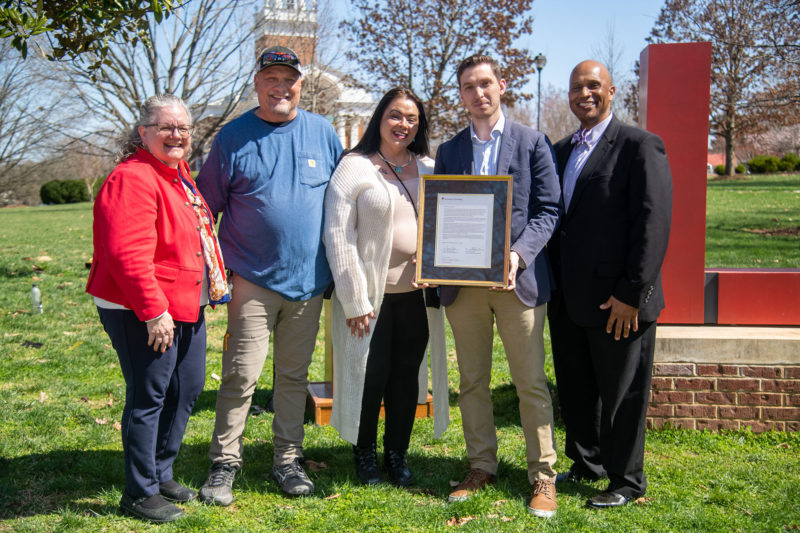
During a ceremony on Monday afternoon, University of Lynchburg officials formally acknowledged that the campus sits on land once belonging to the Monacan Indian Nation. They also announced a special scholarship for incoming students who are members of the Monacan tribe.
Welcoming a crowd gathered near the LOVE sculpture on the Dell, Vice President for Inclusive Excellence Dr. Robert Canida II called the acknowledgement, which included Monacan representatives among its speakers, a “historic event.”
While the University’s Land Acknowledgement statement was initially signed in February, it had been in the works for many months and involved a committee of several Lynchburg faculty, staff, and students, including some who are members of the Monacan tribe.
The Rev. Dan Harrison, who is a pastor at Lynchburg’s Church of the Covenant and a member of the Choctaw Nation, offered a prayer that repeated the phrase, “With gratitude, I will remember,” echoed by those assembled.
Director of Sustainability Dr. Laura Henry-Stone spoke about the connection between environmental stewardship and social justice, which she’d first brought up during a faculty meeting almost a year ago.
That connection was emphasized again and again.
“People are the land. Thank you on behalf of my people,” said Lou Branham, a former Monacan assistant chief and now director of the Monacan Indian Nation Ancestral Museum.
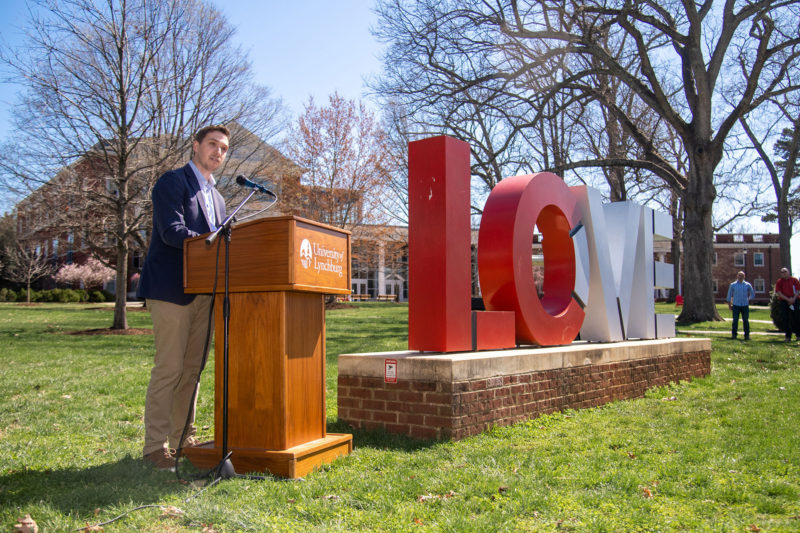
University of Lynchburg alumnus Bradley Branham ’15, son of Lynchburg maintenance supervisor Dean Branham, read the Land Acknowledgement statement.
He did so after citing the poem “Remember” by U.S. Poet Laureate Joy Harjo, and insisting that the acknowledgment create “true access to education” for Monacans.
“Long before the University of Lynchburg was established in 1903 as an educational institution, the Monacan Indian Nation inhabited this land and the greater Piedmont region of Virginia for more than 10,000 years,” the Land Acknowledgement begins.
“We honor the Indigenous people of this region who have woven their lives into the nearby mountains that rise and rivers that flow across the land. We honor the indigenous people of this region who have hunted, harvested, crafted, traded, worshiped, and dreamed, educating their descendants through storytelling and oral traditions.”
Recognizing that “oppression, disease, and systematic attack,” as well as educational inequities, decimated the Monacan Indian Nation, Branham, reading from the statement, also noted that the tribe still counts more than 2,000 members today.
“The tribe is dedicated to reclaiming its heritage, celebrating its traditions, and being good stewards to their ancestral land,” he said.
“We recognize that the Monacan Indian Nation is an integral part of the Lynchburg community, and we recognize the importance of providing equitable teaching and learning opportunities to all indigenous communities.
“Adhering to the University of Lynchburg’s mission statement, this Land Acknowledgement challenges us all, students, staff, and faculty to develop balanced perspectives and engage with a globally diverse society to better understand our collective history and commitment to broader communities.”
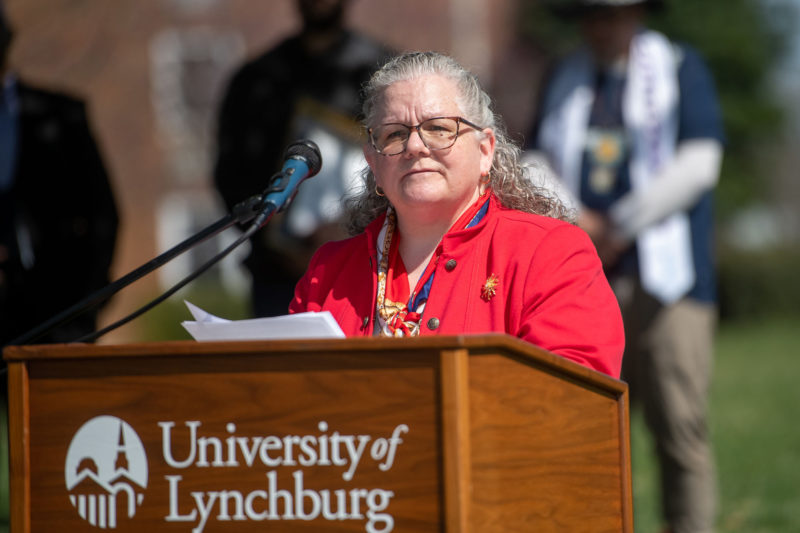
In the spirit of providing such learning opportunities, Provost Dr. Allison Jablonski stepped up to the podium next to make a special announcement.
“The University of Lynchburg and the Monacan Indian Nation will be stronger together while changing lives,” Jablonski said.
She outlined a series of small and large initiatives, including an oral history project and collaboration between the School of PA Medicine and the tribal health clinic. The next item on her list was a surprise to many in attendance.
“Our gathering today is an ideal time to announce the establishment of the Monacan Nation Scholarship here at the University of Lynchburg,” Jablonski said. “Over the years, members of the Monacan tribe have studied and worked here at the University. They have been at the heart of the Lynchburg family.
“Today, we are pleased to recognize the great value of our friendship and to offer scholarship support to Monacan tribal members who wish to pursue higher education with us.”
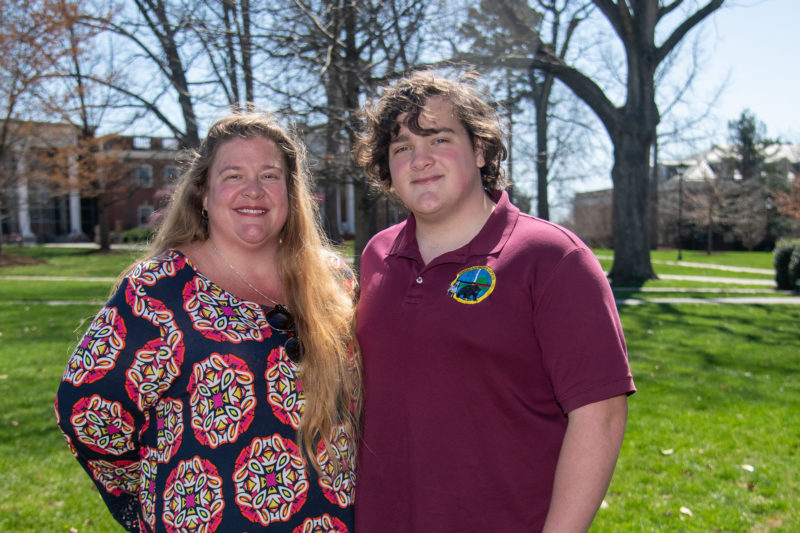
The scholarship is available to incoming, full-time students who qualify for admission to the University. It’s renewable for four years and is among the University’s highest monetary awards, Jablonski said.
Combined with state and federal financial aid and scholarships, it provides full tuition for high-need Virginia students, while students with lesser financial need will be able to finance a large portion of their tuition.
The total scholarship amount will adjust each year based on changes in tuition. For Fall 2022, it’s equal to about $21,500, and there are already two recipients — Amherst County High School seniors McKayla Martin and Nicholas Fink.
Both were a bit shocked when Jablonski called their names.
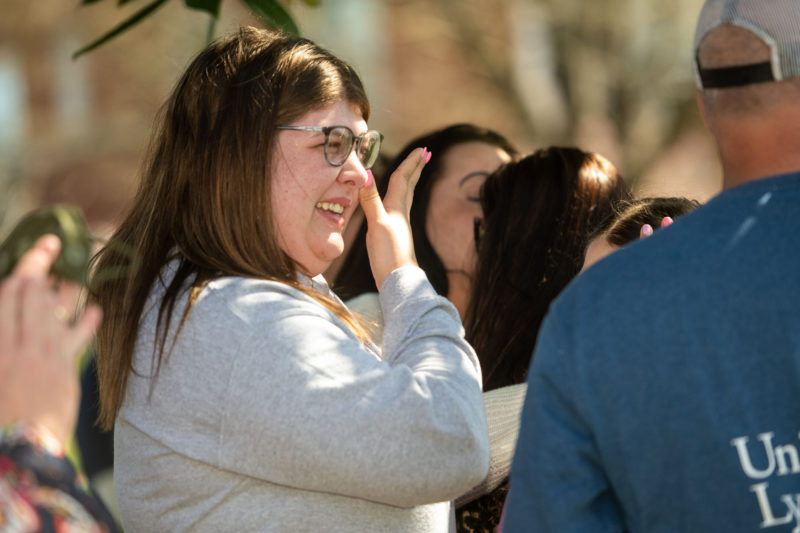
“McKayla and Nicholas, congratulations on your success in high school and our best wishes for your continued success here at the University of Lynchburg,” Jablonski said.
“Welcome to the Hive!”
Hugs and tears followed as the incoming Hornets celebrated the inaugural scholarships with their families, their Monacan family — and their new Lynchburg family.

